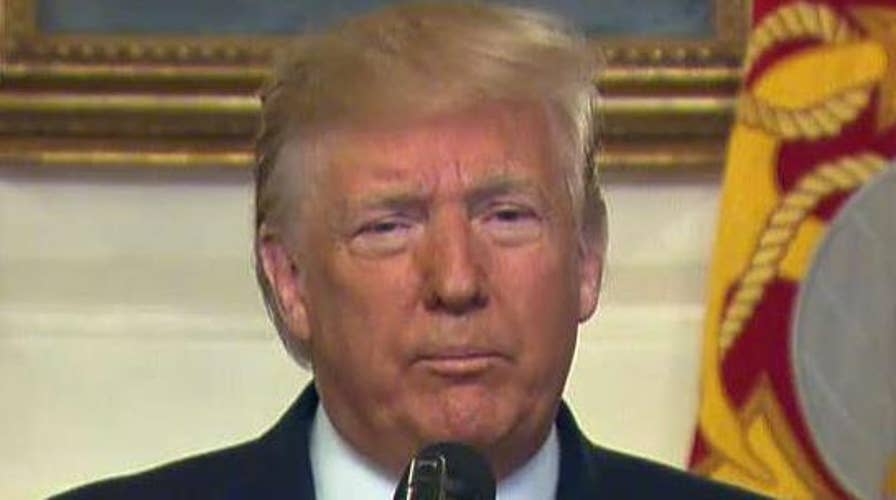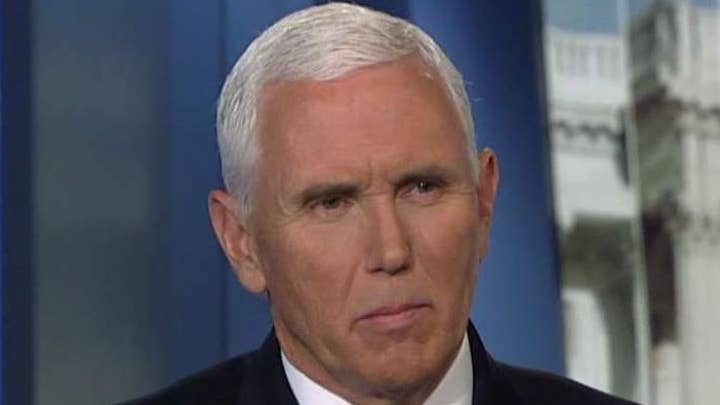Trump addresses the nation following the takedown of ISIS leader Abu Bakr al-Baghdadi
President Trump congratulates U.S. military forces on a job well done and reveals sensitive material was taken from the ISIS raid that killed Abu Bakr al-Baghdadi.
The suicide of Islamic State leader Abu Bakr al-Baghdadi was preceded by a largescale U.S. Special Operations forces raid on a compound in northern Syria’s Idlib Province, where the terrorist leader was thought to be hiding.
In an address to the nation on Sunday, President Trump said that planning for the raid on al-Baghdadi’s compound began two weeks ago when the U.S. gained unspecified intelligence on al-Baghdadi's whereabouts.
Unlike the raid in Pakistan in 2011 that led to the death of Osama bin Laden, which was carried out by a small team of U.S. Navy Seals, the raid on al-Baghdadi’s compound was a relatively large assault by U.S. forces with a reported eight military helicopters landing in the Barisha area north of Idlib city — a few kilometers from the Turkish border.
ISIS LEADER CALLS FOR 'CALIPHATE SOLDIERS' TO FREE DETAINEES FROM CAMPS, CONTINUE ATTACKS
The helicopters flew fast and low to the ground on their approach to the compound and U.S. forces – between 50 and 70 soldiers from the U.S. Army Delta Force and Rangers - were met with sporadic gunfire. But the president said that no American troops or personnel were killed or injured during the raid, during his Sunday morning announcement at the White House.
Much like former President Barack Obama during the raid on Osama bin Laden’s compound, Trump watched the raid unfold on Saturday night from the White House Situation Room. The president described watching the raid while it was underway "as though you were watching a movie."
Trump said U.S. forces breached the walls of the compound since the doors and other entryways were booby-trapped with explosives. Once inside the compound, the U.S. troops chased al-Baghdadi, along with three of the terrorist group leader’s children, into a “dead-end tunnel.”
Once inside the tunnel, al-Baghdadi set off a suicide vest he was wearing, immediately killing himself and his children, while also partially collapsing the tunnel. Trump said U.S. military dogs chased the terrorist into the tunnel and it was reported that at least one of the dogs was injured during the raid.
"He died after running into a dead-end tunnel, whimpering and crying and screaming,” Trump said. “The thug who tried so hard to intimidate others spent his last moments in utter fear, panic and dread – terrified of the American Forces bearing down.”
While al-Baghdadi’s body was severely mutilated in the explosion, his identity was positively confirmed by a DNA test conducted onsite.
The president added that by the time of al-Baghdadi’s suicide, the compound had been cleared by U.S. forces with any combatants either being shot or killed. Eleven young children were reported to have been moved from the compound, with al-Baghdadi’s three children the only ones not making it out alive.
A senior Turkish official said "to the best of my knowledge" al-Baghdadi had arrived at a location in Syria 48 hours prior to the U.S. military raid
The Syrian Observatory for Human Rights, a Syria war monitor, reported an attack carried out by a squadron of eight helicopters accompanied by a warplane belonging to the international coalition on positions of the Hurras al-Deen, an al-Qaida-linked group, in the Barisha area north of Idlib city, after midnight on Saturday. ISIS operatives were believed to be hiding in the area, it said.
It said the helicopters targeted ISIS positions with heavy strikes for about two hours, during which jihadists fired at the aircraft with heavy weapons. The Britain-based Observatory, which operates through a network of activists on the ground, documented the death of nine people as a result of the coalition helicopter attack.
Trump said that following the raid, American forces had landed safely in a third country.
CLICK HERE TO GET THE FOX NEWS APP
Al-Baghdadi had led ISIS for the last five years, presiding over its ascendancy as it cultivated a reputation for beheadings and attracted tens of thousands of followers to a sprawling and self-styled caliphate in Iraq and Syria. He remained among the few ISIS commanders still at large despite multiple claims in recent years about his death and even as his so-called caliphate dramatically shrank, with many supporters who joined the cause either imprisoned or jailed.
Trump said the death of al-Baghdadi shows the United States will continue pursuing other terrorist leaders and that none should rest easy.
"These savage monsters will not escape their fate," he said, adding that the "losers" who worked for al-Baghdadi had "no idea what they were getting into."
Fox News Jennifer Griffin and The Associated Press contributed to this report.













































